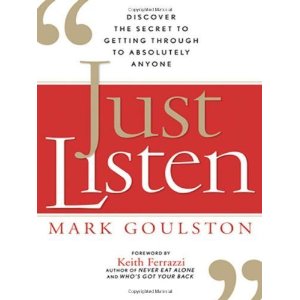Not being heard can be frustrating, angering, and sometimes it can be downright depressing.
On the other hand, being someone who doesn’t listen effectively, can have devastating results on work and personal relationships.
How do we improve this situation?
The problem is that we have encountered SO MANY solutions, tips, suggestions, and examples of listening techniques. Most (in my opinion) are common sense, and boring.
Don’t get me wrong…perhaps we forget to use the simple techniques, and EVERYONE has an off-day. Maybe even an off-week. But seriously, have a look at the few solutions that I found duplicated on countless web pages, and feel free to let me know if any of these are actually mind blowing.
Ahem….
– Look at the person who is talking
– Put aside distracting thoughts.
– Don’t mentally prepare a defense.
– Nod occasionally.
– Paraphrase.
– Ask questions to clarify.
Ugh! Over-the-top eyeroll!
Let me be clear. The above points are true. But again, I’m pretty sure that they didn’t come as a surprise to anyone. I think in addition to the above techniques, we need a fresh look in how to improve communication, effective listening and being heard.
 Then, I came across a book that had a simple title, but an AMAZING take on the whole listening phenomenon. The book is titled “Just Listen – The secret to getting through to absolutely anyone” and Mark Goulston is the author. I am so excited about this book, and I want to share a snippet with you.
Then, I came across a book that had a simple title, but an AMAZING take on the whole listening phenomenon. The book is titled “Just Listen – The secret to getting through to absolutely anyone” and Mark Goulston is the author. I am so excited about this book, and I want to share a snippet with you.
The author believes that it is possible to persuade anyone to our point of view, even in challenging situations. Have a read of his 9 core rules to get through to anyone, and let me know what you think. As you will note, many of the rules actually charge the speaker with the responsibility to change their behaviour in order to be heard.
9 core rules to get through to anyone
1. Move yourself from “OH f#@& – to – OK.” The author states that, “Getting your emotions under control isn’t just a key to being a great leader….it’s also the most important key to reaching other people, especially in times of stress or uncertainty.” This is why hostage negotiators get through to those who seem unreachable, and in contrast why someone who is crying and screaming can turn off the best empathetic listener.
2. Rewire yourself to listen. We tend to judge others instantly because we’re basing them on everything we know about past experiences with people. Consequently, everyone we meet then goes through this filter, and ultimately creates fictional people in our lives. We are not seeing them as their real self, and it will affect how we listen to them. What they say will be distorted to us.
What is the solution?
Think about a person who drives you nuts, and then think of 5 secrets that could underlie the person’s behaviour. Perhaps that person is going through a divorce, having financial trouble, has Post Traumatic Stress Disorder, or is worried about job stability. Once you do this, and get to know the real person you should find that listening becomes much easier.
3. Make the other person feel “felt.” All around the office, in every type of work position, people need to feel “felt”. The same goes for clients, suppliers, and of course in our own personal relationships. Goulston states that, “Making someone feel felt, simply means putting yourself in the other person’s shoes.” When this occurs, you will find that people will stop trying to get the better of each other, instead there will be cooperation, and effective communication.
4. Be more interested than interesting. Think of a conversation like a detective game, and try to find out as much as you can about the other person. Ask questions that let the other person tell their story. When you don’t try to trump their narrative, you will easily find yourself genuinely listening.
5. Make people feel valuable. When you make people feel valuable, “you give them a gift that’s beyond price. In return, they’ll often be willing to go to the ends of the world for you.” It makes perfect sense that when you make others feel valuable (even those who are challenging in your life), they will be more open to hear what you have to say.
6. Help people to exhale emotionally and mentally. When stress becomes distress, the other person can become unreachable. Give a distressed person breathing room, rather than adding to stress. If the person wants to vent, it is important to not get defensive. Although difficult, instead say, “tell me more”. In return the person will know that you are listening to them, and will ultimately reciprocate.
7. Check your dissonance at the door. Dissonance happens when, “you think you’re coming off as wise, but people see you as being sly – or when you think you’re coming off as passionate, but other people think you’re over-the-top.” When this happens, people don’t listen. They check-out.
Dissonance also happens when you think you perceive someone else accurately, but the other person doesn’t agree. For example, has anyone ever said to you “I understand where you are coming from”, when they clearly have no real understand what your situation is?
Have a thick skin, and ask your friends and family what your worst traits are. Be knowledgeable and truthful about your areas of dissonance, and you will find that it will be easier to get others to listen to you.
8. When all seems lost – bare your neck. Being vulnerable will allow others to “show their neck” as well. It’s okay to say, “I’m scared” or “I made a mistake”. The author states that he has even had success with difficult top executives with this method. Employees will generally feel empathy, and will be more apt to listening in the future.
9. Steer clear of toxic people. Sometimes reaching out is a mistake. Toxic people are those who won’t cooperate or take steps to modify behaviour. They instead blame others and continually lash out with no end in sight. Some people don’t want to make your life better. They want to “suck you dry”, con and bully you. It is best to “strip these people of the power to hurt you”.
This book drastically changed my perspective on listening.
Maybe, just maybe I need to stop getting frustrated when I feel that I haven’t been heard. Instead, I should look inward to see how I can better position myself to get my point across.
And, on a personal note, I LOVE THIS BOOK. I feel that EVERYONE should read it. By everyone, I mean – ANYONE that has personal relationships, and ANYONE that works in or out of the home. And yes, I already have my husband on board to read it!

